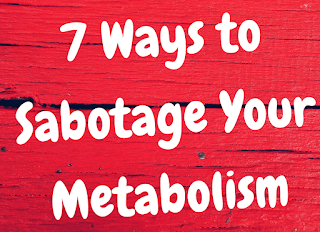There are probably a few things in your life that you’d like to slow down…
But when it comes to your metabolism? Probably not.
Unfortunately, there are plenty of sneaky ways we slow our metabolism down — here are 7 of the most common metabolism saboteurs:
1, You don’t eat enough
Your body is smart! When you regularly eat less fuel than you burn, your body can make itself even more efficient by lowering how many calories it needs.
This can happen if 1) you exercise a lot and don’t ramp up your food intake to match it; 2) you undereat every day, or 3) go on a lot of diets.
2. You skip meals
Research shows that eating regular meals throughout the day is linked with a greater “thermic effect of food” – i.e., more calories burned after eating.
Plus, eating on a regular schedule helps your body manage its blood sugar levels, which is a biggie when it comes to your health.
3. You don’t lift weights
Strength training helps boost your metabolism in a couple of different ways.
Over the long run, it helps build muscle, and muscle tissue burns more calories at rest than fat tissue.
But it also has an immediate benefit: it raises your metabolism for hours after your workout is finished.
4. You slack on your sleep
Not getting enough sleep is like a triple whammy on your metabolism.
- When you’re tired you’re not as active, which means a lower daily calorie burn
- You tend to eat more when you’re sleep-deprived because it messes up your hunger hormones and makes you crave high-calorie foods
- Your body has a harder time managing blood sugar levels when you’re low on sleep, which can make you store fat
5. You sit all day
Being sedentary – i.e., not getting up to move around every half-hour or so — is linked with a slower metabolism. Time for that standing desk!
6. You don’t eat enough protein
Not only does protein keep you feeling full after you eat it, but it also helps you build metabolism-boosting muscle.
Plus, digesting it burns more calories than digesting carbs or fat.
Some guidelines: aim for between .73 and 1 gram of protein for every pound of your weight (1.6 and 2.2 grams per kilogram of your weight).
7. You get stressed out a lot
It’s true! Stress can LOWER your metabolism.
An Ohio State University study found that women burned fewer calories after they ate a high-fat meal when they were stressed.
Just another reason it’s so important to have a plan to regularly blow off stress, like working out, meditating, or relaxing hobbies!
How many of those rang a bell for you?

Comments
Post a Comment